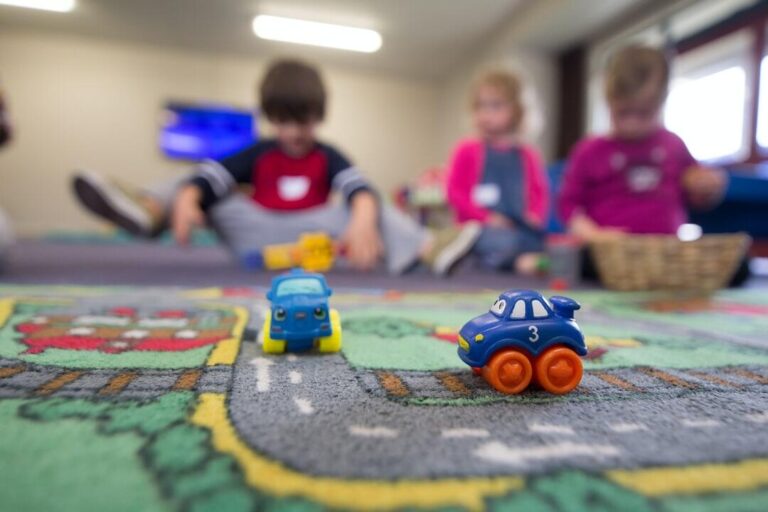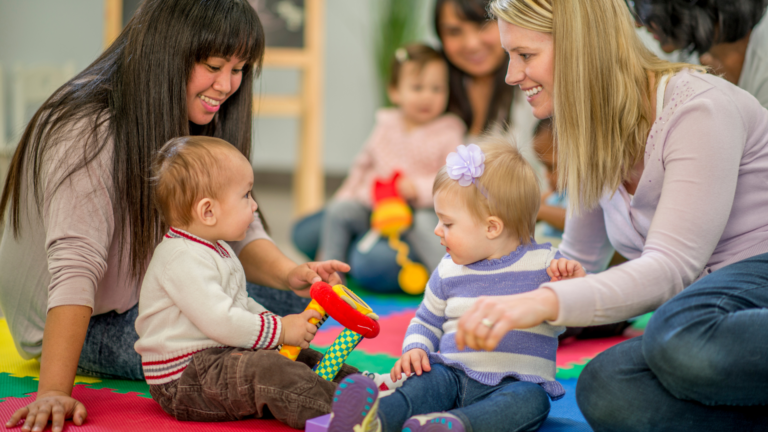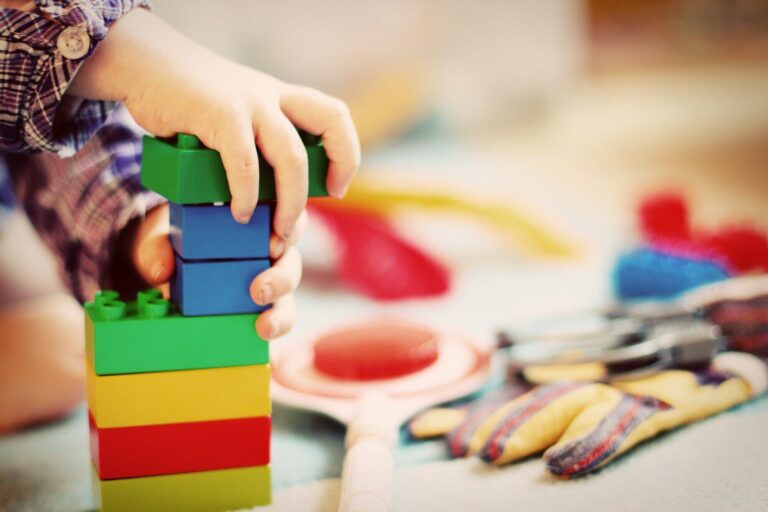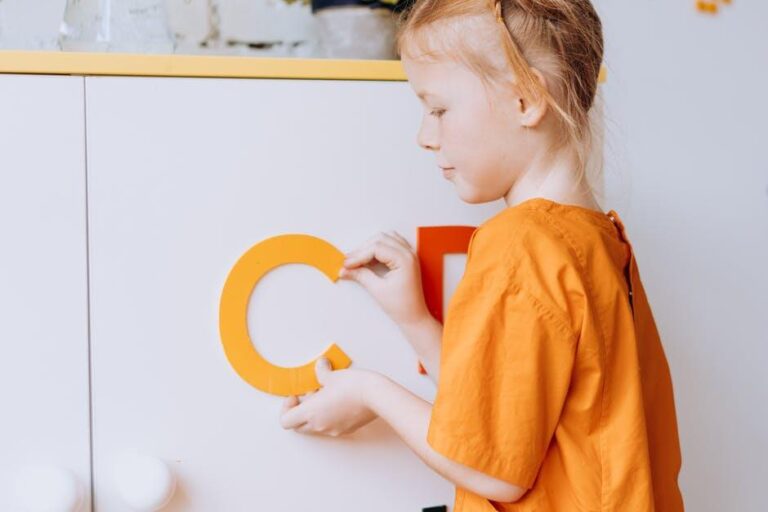The Role of Play in Child Development: Why It’s More Than Just Fun
Play is an essential part of child development, and its importance goes far beyond simple fun and games. At Happy Bunnies Child Care School, we recognize that play is a powerful tool for fostering child development. It builds cognitive, physical, emotional, and social skills that children carry with them throughout life. This article explores why play is so vital and how it shapes children into confident, capable learners.
What Is the Role of Play in Child Development?

Children are naturally curious, and play provides a safe, enjoyable way for them to explore the world. Through play, they develop critical skills such as problem-solving, communication, and creativity. These activities lay the foundation for success in school and beyond.
Play also serves as a platform for self-expression, allowing children to process their thoughts and emotions. For instance, when a child engages in pretend play, they experiment with social roles, practice decision-making, and explore their environment, all while having fun.
At Happy Bunnies, we encourage play as a cornerstone of our approach to child development. Our thoughtfully designed activities inspire children to think, move, and connect with others while developing key life skills.
The Benefits of Play for Cognitive Development
Play enhances brain development in several key ways. Activities like puzzles, building blocks, and memory games stimulate cognitive growth by encouraging children to think critically and solve problems. For example:
- Sorting shapes or colors helps children develop early math and classification skills.
- Playing memory games strengthens recall and concentration.
- Building towers with blocks teaches concepts like balance, size, and spatial reasoning.
- Imaginative play also boosts creativity and abstract thinking. A simple game of pretending to be a chef or astronaut encourages children to use their imagination while exploring new concepts and scenarios.
How Play Supports Social and Emotional Development
One of the most profound benefits of play is its impact on social and emotional growth. Group activities such as board games, pretend play, and team sports teach children how to:
- Share and take turns.
- Collaborate with others.
- Navigate conflicts and disagreements.
These skills are crucial for building healthy relationships later in life. Furthermore, play helps children develop empathy. By pretending to be someone else, such as a doctor or a teacher, they begin to understand different perspectives and emotions.
Emotionally, play provides a safe outlet for children to express themselves. When kids build a sandcastle or draw a picture, they communicate feelings they might not yet have the words to describe. This fosters emotional intelligence and resilience.
Types of Play and Their Impact on Development
Different types of play contribute uniquely to child development:
- Imaginative Play: Activities like dressing up as a superhero or creating a make-believe world foster creativity and problem-solving skills.
- Physical Play: Running, jumping, climbing, and dancing improve motor skills, coordination, and physical fitness.
Social Play: Games with peers help children develop cooperation, communication, and conflict-resolution skills. - Independent Play: Activities such as reading, drawing, or playing with puzzles encourage self-reliance and concentration.
- Structured Play: Guided activities like storytelling, crafts, and educational games blend fun with intentional learning outcomes.
At Happy Bunnies, we incorporate all these forms of play into our curriculum, ensuring that children benefit from a well-rounded approach to development.
The Connection Between Play and Academic Success
Play is directly linked to academic achievement. Research shows that children who engage in play-based learning are better prepared for school. Here’s how:
- Language Development: Singing songs, playing word games, and storytelling enhance vocabulary and communication skills.
- Math Readiness: Games involving counting, sorting, or measuring build foundational math concepts.
- Critical Thinking: Open-ended activities like building with blocks or solving puzzles encourage problem-solving and reasoning.
In addition, play strengthens executive function, which includes planning, focusing, and managing tasks—skills essential for success in any classroom.

Physical Growth Through Play
Active play isn’t just fun; it’s essential for physical health. Activities like climbing on playground equipment, running, or playing with balls improve children’s strength, coordination, and balance. Fine motor skills are also developed through activities such as drawing, cutting with scissors, or playing with small toys.
Physical play has other benefits, too. It helps children develop an understanding of their bodies and the importance of staying active, laying the groundwork for a healthy lifestyle.
Play as a Tool for Emotional Well-Being
Play is a powerful stress-reliever for children and critical for child development. It allows them to unwind, relax, and process emotions in a healthy way. For example, a child who has had a challenging day might find comfort in building with blocks or creating art.
Play also builds resilience by teaching children how to cope with challenges. Whether they’re figuring out how to put together a tricky puzzle or learning to share toys with a friend, they’re developing skills that will help them navigate life’s ups and downs.
Our Play-Based Approach at Happy Bunnies Child Care School
At Happy Bunnies, we believe that play and learning go hand in hand and we prioritize it because it gives an important part for child development. Our play-based curriculum is thoughtfully designed to nurture every aspect of child development.
Here’s what makes our approach special:
- Balance of Structure and Freedom: We combine guided activities with plenty of time for free play, allowing children to explore their interests and build independence.
- Engaging Learning Environments: Our classrooms and play areas are set up to inspire curiosity, creativity, and collaboration.
- Supportive Teachers: Our educators actively engage with children during play, helping them connect their activities to broader learning concepts.
Whether it’s crafting, storytelling, or outdoor games, every activity at Happy Bunnies is designed to spark joy and encourage growth.
Why Play Is More Than Just Fun and Vital For Child Development
At its core, play is how children learn about the world and themselves. It’s how child develop critical thinking skills, make friends, and build confidence. It’s how they prepare for the future while living fully in the moment.
At Happy Bunnies Child Care School, we are proud to provide an environment where play is celebrated as a vital part of child development. Through play, we help children grow into curious, confident, and compassionate individuals.
Do you want to see how we make learning fun through play? Schedule a visit to Happy Bunnies Child Care School today and discover how we nurture your child’s growth and happiness every day!







